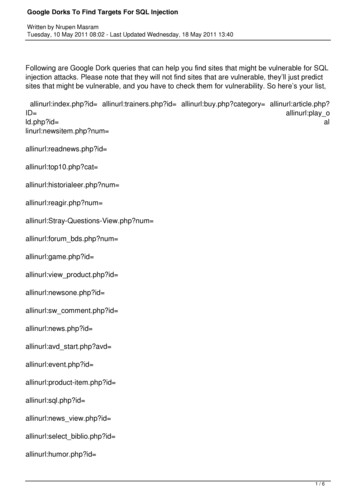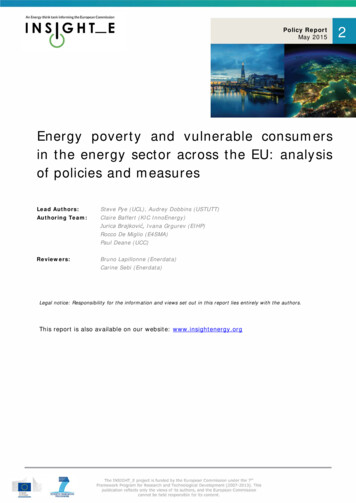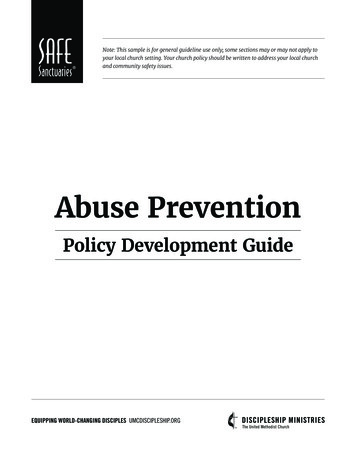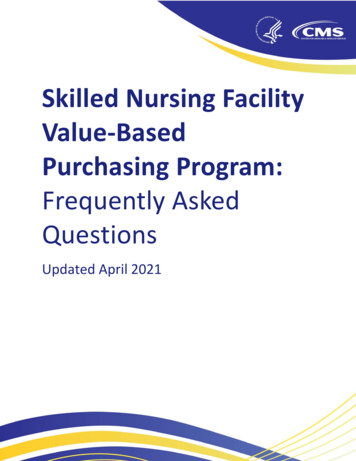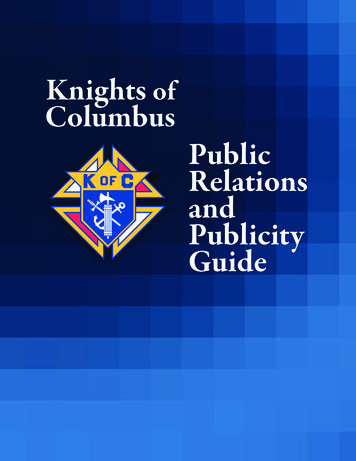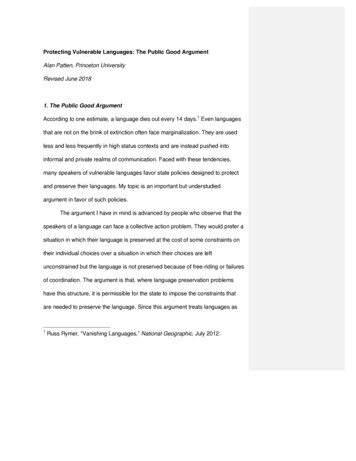
Transcription
Protecting Vulnerable Languages: The Public Good ArgumentAlan Patten, Princeton UniversityRevised June 20181. The Public Good ArgumentAccording to one estimate, a language dies out every 14 days.1 Even languagesthat are not on the brink of extinction often face marginalization. They are usedless and less frequently in high status contexts and are instead pushed intoinformal and private realms of communication. Faced with these tendencies,many speakers of vulnerable languages favor state policies designed to protectand preserve their languages. My topic is an important but understudiedargument in favor of such policies.The argument I have in mind is advanced by people who observe that thespeakers of a language can face a collective action problem. They would prefer asituation in which their language is preserved at the cost of some constraints ontheir individual choices over a situation in which their choices are leftunconstrained but the language is not preserved because of free-riding or failuresof coordination. The argument is that, where language preservation problemshave this structure, it is permissible for the state to impose the constraints thatare needed to preserve the language. Since this argument treats languages as1Russ Rymer, “Vanishing Languages,” National Geographic, July 2012.
2public goods in something like the economist’s sense, I shall call it the “publicgood argument” for language preservation.The public good argument is hardly the only argument to be advanced onbehalf of preservationist policies. Some advocates of such policies stress theimportance of language to “identity,” and ask “After all, if we’re concerned withidentity, then what is more legitimate than one’s aspiration that it never be lost?”2Others emphasize the connection between language and culture, arguing thatindividuals depend on a healthy culture for their access to an adequate range oflife options.3 Yet another form of preservationism regards languages asintrinsically valuable. Rather like works of art, they are products of humancreativity and ingenuity, and they ought not to be destroyed or underminedwithout a sufficiently good reason.4In my view, each of these other arguments contributes an importantperspective to normative debates about language policy. The connectionsbetween language, on the one hand, and identity, culture, and intrinsic value, onthe other, point to plausible reasons why people might care about the health andprosperity of their language and/or their particular language community. Except inspecial circumstances, however, the fair way for public institutions to respond tothese reasons is by offering equal treatment or status to the various languages2Charles Taylor, “The Politics of Recognition,” in Amy Gutmann ed.Multiculturalism and the Politics of Recognition (Princeton, 2004) p. 40.3Will Kymlicka, Liberalism, Community and Culture, (Oxford, 1989) andMulticultural Citizenship (Oxford, 1995).4David Crystal, Language Death (Cambridge, 2000).
3spoken by the citizens living under those institutions. Rather than elevating someparticular language to a dominant official status, public institutions shouldrespond in a proportionate manner to demand for services (e.g. schooling) in aparticular linguistic medium.5Although this regime of equal treatment will sometimes be of great valueto speakers of vulnerable languages (who might otherwise find their languageexcluded from public institutions altogether), it may be insufficient to preservesome particular language in the long run. The equal treatment by publicinstitutions of the several languages spoken in the community does notguarantee that those languages will be equally successful or even that they willall survive. The inegalitarian pressures of the economy, of global culture, ofdemographics, and of other determinants of language use, may swamp thepreservationist tendencies fostered by equal treatment by public institutions.This possibility leads some observers to conclude that equal treatment istoo formal an approach to language policy. Equal treatment entails giving thesame public rights, benefits, and resources to all even when it is predictable thatsome will race ahead and others lag behind. By treating all languages the same,very unequal outcomes result. For those who find this possibility objectionable, itis tempting to emphasize once again the importance of language for identity,culture, and intrinsic value. But, if my earlier comments were on the mark, thissimply leads back to a regime of equal treatment. On plausible assumptions, the5Alan Patten, Equal Recognition: The Moral Foundations of Minority Rights(Princeton, 2014).
4claims relating to identity, culture, and value are fairly accommodated by equaltreatment itself. There is no further right to a successful culture, identity orrealization of intrinsic value that would justify unequal treatment. Evidence for thiscomes from a comparison of language and religion. Many regard religion as anobject of identity, a matter of culture, and a source of intrinsic value. But fewwould infer that there is a right to a successful religion; at most, theseconsiderations bolster the argument for the equal treatment of religions.The public good argument is worth considering because it suggests a wayof defending further protections for a vulnerable language beyond those that areenjoyed as a result of equal treatment. The public good argument points to onesignificant difference between the situations of dominant and vulnerablelanguage speakers, which is that the latter but not the former face a collectiveaction problem. It is this difference, so the argument goes, that gives the stateadditional license to intervene in particular ways on behalf of a vulnerablelanguage, even if this means some departures from equality of treatment. Thepublic good argument also highlights a difference between religion and language.As Jean Laponce once put it, “I don’t have to pray with my neighbor, but I dohave to talk with him.”6 Because language involves a level of social coordinationthat is not generally necessary for religion, it is more vulnerable to collectiveaction problems than religion.6Jean Laponce, Langue et territoire (Laval, 1987), p. 143.
5Historically, something like the public good argument was an importantpart of the logic behind Quebec’s language legislation. We shall look at thisexample in the next section. In recent years, the argument has received renewedattention from several prominent political scientists and philosophers. David Laitinargues that language communities and policies should be considered asconsumption goods.7 Groups may try to mobilize to get the state to provide thisor that good, and beyond some bedrock liberal principles, the test of legitimacy issimply success in the democratic process. According to Laitin, “communitiesshould be free to provide the public goods its taxpayers demand just so long asfundamental liberal principles are not violated”.8A key argument of the 2011 book on linguistic justice by Philippe VanParijs can also be understood as a version of the public good argument.Following the approach developed by Laponce, Van Parijs argues that, becauselanguage is a tool for communication, its use always involves a form ofcoordination between people. When a multilingual person attempts tocommunicate with some other person or group, she must think, not just about herown preferences for language use, but, crucially, also about the languagecompetences of her intended audience. She must look, in other words, for alingua franca: a language that both she and the members of her intended7David Laitin, Nations, States and Violence (Oxford, 2007) 115-28.Ibid. p. 117. See also Yael Tamir, Liberal Nationalism, (Princeton, 1993), p. 54;and David Miller, On Nationality.8
6audience can speak.9 This need to coordinate on a lingua franca can lead tocollective action problems in which speakers of a vulnerable language find itpersonally convenient and advantageous to learn and use the more dominantlanguage, even though if they could only coordinate their resistance to thedominant language the incentives would be reversed, dominant-languagespeakers would find it advantageous to learn the vulnerable language, and thevulnerable language would serve as the lingua franca.Van Parijs finds a linguistic rights regime based on equal treatment to beobjectionable when it applies to a situation in which the speakers of onelanguage are plagued by these collective action problems and the speakers ofthe other are not. The equal treatment approach leaves too much to bedetermined by the disaggregated, uncoordinated decisions of individuals. It is alltoo predictable that vulnerable languages will fare poorly in this environment, andthat speakers of those languages may collectively produce an outcome that theydisprefer to the outcome that would ensue if all (or at least most) of them stuck inthe critical situations to the use and transmission of their own language. There isa role to be played by the state, on this argument, in raising the status of thevulnerable language to the point where it becomes the preferred lingua franca.10My aim in this paper is to explore some of the contours of the public goodargument. Although I maintain that the equal treatment model ought to beaccorded a central place in an account of linguistic justice, I do think there is9Philippe Van Parijs, Linguistic Justice in Europe and the World (Oxford, 2011).Ibid., ch. 5.10Alan Patten 6/5/2018 2:11 PMDeleted: theirAlan Patten 6/5/2018 2:11 PMDeleted: own
7something to the public good argument and that such an argument can justifysome genuine departures from equal treatment that are designed to betterprotect vulnerable languages. I shall argue against a more skeptical account ofthe public good argument, which suggests that the argument would hardly everjustify special government protections for vulnerable languages. At the sametime, I doubt that the public good argument justifies a significant departure fromthe equal treatment model. Where background conditions are just, there areimportant limits on the reach of the public good argument. The account to bedeveloped below helps to identify and justify these limits.2. Language Community as a Public GoodLet me start with some examples to motivate the public-good lens that is beingadopted here. In Montreal, in the 1960s, immigrants were given a choice over thelinguistic medium in which their children were educated in the public schoolssystem. There were public schools operating in both French and English, andparents could choose between them. For a variety of reasons, there was apronounced tendency for immigrants to select an English-language option.Although Francophones represented a majority of more than 60% of Montreal’spopulation in the 1960s, around 90% of Allophone children (children whoseparents were neither native French- nor native English-speakers) were enrolledin English-language schools.11 As the birthrate amongst Francophone Quebecers11Marc Levine, Reconquest of Montreal (Temple, 1990) p. 56. See also p. 101.Alan Patten 6/5/2018 2:17 PMDeleted: -
8was also falling at this time, immigrant school choices contributed to a seriousanxiety that it was only a matter of time before French-speakers were relegatedto minority status in Montreal. With this anxiety in the background, there wererenewed efforts to make French-language schools more open andaccommodating to new immigrants. And legislation passed in the 1970s (Bills 22and 101) included measures that compelled Allophone children (with limitedexceptions) to attend public school in French.At the same time, another deeper source of anxiety concerned the schoolchoices of Francophone parents. In the 1960s, a choice between French- andEnglish-language public schools was given not just to immigrants and Englishspeakers, but to all Quebecers, including French-speakers. French-speakingparents could decide to educate their children in English schools if they sopreferred. And while this was not an option that a great many ever took (inMontreal about 3% of Francophone children attended English-language schoolsin the 1960s and early 70s)12 there was some reason to fear that an increasingnumber of Francophone parents would avail themselves of this opportunity.Traditionally, proficiency in English was not an essential requirement foremployment in sectors where Francophone Quebecers tended to work. But withthe economic and social changes of the 50s and 60s, Francophones increasinglysought out positions in white-collar positions in which English was an asset.These social and economic changes created an incentive for Francophone12Ibid.
9parents to try to give their children an extra boost by sending them to Englishlanguage schools. The more that parents responded to this incentive the morethat French would have been pushed into the margins of life in Montreal.On plausible assumptions about the preferences of Francophones, thesituation they were beginning to face had the structure of a prisoner’s dilemma(PD). Suppose to begin with that Francophone parents in this situation have tworelevant goals. First, they care about the fate of their own linguistic community.They want to see it survive and flourish, in part because they want to have theopportunity for themselves and for their children to use and enjoy the language ina wide range of contexts. Second, they care about the particular social andeconomic advantages of their own children. They want their children to beupwardly mobile, and they recognize that proficiency in English is an importantasset for this purpose. (They have a third goal too, which is that their childrenlearn French to facilitate intra-family communication in French. But they expectthis goal to be realized adequately within the family and thus it is not relevant toschooling choices.)The PD structure arises when parents have the following preferenceordering:Alan Patten 6/5/2018 3:15 PMDeleted: parents combine and rank thetwo relevant goals in certain ways.Suppose thatAlan Patten 6/5/2018 3:15 PMDeleted: generally1. The French language community survives and flourishes; they educate theirchildren in English.Alan Patten 6/5/2018 3:16 PMDeleted: give advantages to their childrenby educating them
102. The French language community survives and flourishes; they educate theirchildren in French (with English taught as a subject).3. The French language community does not survive and flourish; they educatetheir children in English.4. The French language community does not survive and flourish; they educatetheir children in French (with English taught as a subject).If parents are at liberty to make their own choices about the language ofAlan Patten 6/5/2018 3:16 PMDeleted: forgo the advantages ofeducating their children in English andinsteadAlan Patten 6/5/2018 3:16 PMDeleted: mAlan Patten 6/5/2018 3:16 PMDeleted: give advantages toAlan Patten 6/5/2018 3:16 PMDeleted: by educating themAlan Patten 6/5/2018 3:17 PMDeleted: forgo the advantages ofeducating their children in English andinsteadAlan Patten 6/5/2018 3:17 PMDeleted: meducation, then a PD follows from these preferences. Parents will assume thatwhichever choice they make will have no perceptible impact on the survival orflourishing of their linguistic community. Given that assumption, it is rational forthem to choose the option that advances their other relevant goal, namely,conferring social and economic advantages on their own children. But onceenough of them reason in this way, the cumulative effect is to jeopardize thesurvival and flourishing of the linguistic community.Here is a second example of the phenomenon, adapted from the VanParijs argument described earlier. Dutch-speakers in 1950s Belgium areattempting to communicate in an interpersonal setting with both Dutch-speakersand French-speakers. French-speakers have some level of proficiency in Dutch,and Dutch-speakers have some proficiency in French, but the second-languageproficiency of Dutch-speakers is generally superior. Dutch-speakers in thisAlan Patten 6/5/2018 3:18 PMDeleted: They end up with their thirdpreference.
11context have two relevant goals: the survival and flourishing of their language,and effectively communicating with others.Suppose that the preferences of individual Dutch-speakers are as follows:1. Their language community survives and flourishes; and they use French inmixed interpersonal settings with Dutch- and French-speakers.2. Their language community survives and flourishes; and they use Dutch inmixed settings.3. Their language community does not survive and flourish; and they use Frenchin mixed settings.4. Their language community does not survive and flourish; and they use Dutchin mixed settings.Again the preference ordering gives rise to a PD. Each will reason thattheir personal choice of language in a given communicative interaction will haveno perceptible impact on the security of Dutch. So they will focus on their goal ofeffective communication, which, given the weaker second-language proficiencyof French speakers, implies opting for French. But to the extent that this patternis repeated over and over again, it will ultimately jeopardize the security of Dutch.Dutch-speakers will have incentives to perfect their French further, while Frenchspeakers will have no corresponding incentive to learn Dutch.
12One complication is that Dutch-speakers might adopt a more dynamicperspective in their reasoning about language use. They might expect that ifenough of them insist on using Dutch in mixed settings then local Frenchspeakers will have an incentive to improve their level of proficiency in Dutch. Ifthat were to occur, then their first and second preferences would be reversed,and the structure of the game would now be that of an assurance problem. IfDutch-speakers can be assured that enough from their ranks will insist on theuse of Dutch, then there would (eventually) be no trade-off between the personaluse of Dutch in a mixed setting and the security of the language. The problem,however, is that, in the absence of such assurance, French remains the preferredchoice for personal communication.It would be possible to construct many similar cases where languagechoices have these familiar PD- and Assurance-game structures. What thesecases share in common is that the survival and flourishing of the (local)community of speakers of the vulnerable language is assumed to be a publicgood. To be sure, the goods associated with a particular language and languagecommunity are fully available only to those individuals who are proficient in thelanguage. They are goods derived from participating in the language community,which implies at least some minimal level of comprehension and conversationalability. In addition, some of the goods associated with a language community -e.g. much of its arts and entertainment -- are accessible only to people who canafford to pay for the relevant cultural goods. In this sense, the benefits of aAlan Patten 6/5/2018 3:32 PMDeleted: aAlan Patten 6/5/2018 3:33 PMDeleted: or
13distinctive language community are not available to everyone; some people areexcluded.In spite of these considerations, we can say that a language community isa public good for its members because it is characterized by what economiststerm “non-excludability”: if it is available for the enjoyment of anyone in the groupwho satisfies conditions like those mentioned above, then it would be unfeasibleor unacceptably costly to exclude others in the group from enjoying the good,even if those others have not made contributions to the cost of supplying thegood. For the purposes of the analysis here, the public-good status of languagecommunities is not meant as a conceptual or logical claim, but as one that isempirical and normative in character and that is, to some extent, a matter ofdegree. The degree to which a good such as a language community ought to beconsidered public depends on the feasibility of restricting non-contributors fromaccess to the good and on the moral character of any proposed mechanisms forrestricting access (e.g. shunning or shaming non-contributors)13.A standard and well-known problem with many public goods is that theyare underprovided, or not provided at all, by decentralized decision-makingprocesses such as the market. This problem arises most acutely when a good isproduced under conditions that exhibit three features. First, the good is produced(and maintained) by the contributions of many people. The good is not naturallyoccurring, nor is it feasibly provided by a single person or a small number of13For some remarks about shunning, see Van Parijs, Linguistic Justice.
14people. Second, the relevant contributions are costly to those who make them.And, third, a contribution by each and every person who will enjoy the good is notstrictly necessary for the good to be provided. So long as enough people makecostly contributions, the provision of the good will be secured. Public goods withthese features are under-provided when and because individuals notice that theirparticular contributions are costly but unlikely to make a difference to theprovision of the good.Vulnerable language communities fit the profile of public goods that areparticularly vulnerable to under-provision. For a language community to surviveand flourish, many different people need to use the language in a wide range ofdifferent contexts of communication (first condition). Although many uses of thelanguage will be costless – two speakers of a language using their sharedlanguage to communicate together – some of them may come with a cost(second condition). As we have seen, using the language in the schooling ofone’s children, or in a business context, may mean forgoing an advantage thatAlan Patten 6/5/2018 3:35 PMDeleted: In all likelihood, their contributionwill either be insufficient to secure thegood’s provision or superfluous given thecontributions made by others. Whenenough individuals reason in this way, andthey consider the costs associated withmaking a contribution, they will decide notto contribute and the good will beunderprovided.Alan Patten 6/5/2018 3:36 PMDeleted: We have already seen thatlanguage communities are public goodsbecause they satisfy the non-excludabilitycondition. It is now apparent that theybelong in the category ofAlan Patten 6/5/2018 3:36 PMDeleted: when and because they areproduced under conditions that exhibit thethree features just describedwould be derived from the use of a more dominant language. And, while it isnecessary for the survival and flourishing of a language that many peoplecontribute, it is not necessary that everyone contribute (third condition). Somenumber of people could be passive consumers of the language who do notmight survive and flourish as long as enough other speakers were contributing.Alan Patten 6/5/2018 3:38 PMDeleted: (e.g. through schooling choices,in business dealings, or in spendingmoney on popular culture),To the extent that contributing is costly, and that individuals judge that theirAlan Patten 6/5/2018 3:38 PMDeleted: undertaking those costly effortundertake costly efforts to support the language and still the language communityAlan Patten 6/5/2018 3:38 PMDeleted: s
15particular contribution is unlikely to be pivotal, the language community will beunder-supported in a regime where contributions are discretionary. Over time,with all else being equal, one would expect the language to be spoken by adwindling number of people, and for it to occupy an increasingly marginal positionin the society’s patterns of communication.Notice that this analysis need not overlook the importance of language foridentity. The logic of the argument has nothing to do with how or how muchspeakers of a vulnerable language value their language. Even speakers forwhom the language is a core part of identity might be tempted to use a differentmore dominant language in key settings if doing so seems advantageous to themand they do not expect their personal decisions to be consequential for thesecurity of their language.14To be sure, there are serious questions about how far this analysis, oranything like it, approximates the actual condition of real world languagecommunities. As I noted above, in the 1960s when there was choice with respect tolanguage of instruction only a small minority of Francophone families in Montrealopted for English. Arguably, this outcome is consistent with the analysis justproposed, since the advantages of English may not yet have been salient for manypeople, and so the costs of sticking to French were relatively negligible. But it does14Admittedly, linguistic identity could be defined so that possessing such anidentity means being committed to using the language even when it is personallyadvantageous to use another and even when it makes no perceptible differenceto the health of the language or language community. Short of this stipulation,however, the argument sketched in the text is compatible with a range of differentkinds and levels of attachment to one’s first language.Alan Patten 6/5/2018 3:41 PMDeleted: contributing
16raise the question of whether the public good analysis is more illuminating in theorythan in practice. I won’t try to pursue this empirical issue here, but instead willcontent myself with the thought that, if the public good analysis is applicable inactual cases, then an important normative question needs to be considered.The normative question is this. Does the fact that, in some situation, alanguage can be considered an under-provided public good justify state interventionon behalf of that language? An “intervention” in this context means a stateprotection for a vulnerable language that goes beyond a baseline of equal treatmentand freedom of linguistic choice. As we have seen, some commentators argue thatintervention in this sense is justifiable. Laitin suggests it would be justifiable ifdemocratically approved by a majority, so long as the intervention would not violateany basic liberal rights or freedoms. Van Parijs maintains that the collective actionproblems facing vulnerable language-speakers support the adoption of theterritoriality principle. This principle, which was adopted in 1960s Belgium,establishes a territory within the state in which the vulnerable language is in themajority and is designated as the sole public language for official and businesspurposes.1515The regime favored by Van Parijs thus rejects equal treatment within linguisticterritories. But since each language is to get its own territory, there is a sense inwhich equal treatment is realized at a higher level in his model. Insofar as somespeakers are caught on the “wrong” side of the linguistic frontiers, however, theseindividuals do not enjoy equal treatment of their language by the publicinstitutions under which they live. So in general I count the territoriality principleas a departure from the baseline of equal treatment, and thus as something thatneeds a special justification such as the public good argument considered in thepresent article.
17Suppose that the stipulated preferences in the education example areuniversally shared amongst Francophones. With this special assumption granted,many observers would agree that the case for state intervention in the marketplaceof decisions about language is very strong. A prohibition on education in Englishwould make everybody better off, raising them from their third most preferredoutcome to their second most preferred. It is true that there might be technicaldifficulties in determining who is to be considered a Francophone for the purposesof such an intervention. In addition, the idea of distinguishing Francophones fromnon-Francophones and applying different rules to each might be consideredinvidious, divisive, or in some way unfair. I shall return to these concerns later on.But setting them aside for the moment, the case for state intervention seems verycompelling.This analysis is obviously driven by the extreme assumption that all of thepeople who would be directly impacted by a prohibition – Francophone parents –have the same preference orderings with respect to language and education. ItAlan Patten 6/5/2018 3:49 PMDeleted: in the paperAlan Patten 6/5/2018 3:50 PMDeleted: All are made better off by thestandard of their own preferences thanthey would be if the state limited itself toequal treatment (e.g. providing publicschool options in both English and French)and allowed private decisions to playthemselves out.thus abstracts from the most difficult and controversial feature of policies toprotect a vulnerable language: the fact that they typically impose costs andburdens on people who do not share the strong commitment to preserving andpromoting the language that inspires those policies. If it is allowed that someFrancophone parents may be strongly committed to giving their children anEnglish-language education and/or relatively indifferent to the fate of the Frenchlanguage community, then the argument I’ve just sketched is no longer available.Alan Patten 6/5/2018 3:53 PMDeleted: some members of thecommunity
18For these parents, preferences 2 and 3 are swapped, and so it is not the casethat intervention leaves them better off by their own lights.This sort of problem is even more apparent in the example ofcommunication in a multilingual setting. In this case it cannot be presumed thatall who would be directly affected by a state intervention would share the samepreference orderings. The structure of the problem guarantees that there will bewinners and losers. There needs to be a common standard for all (a linguafranca) but different participants have diverging preferences about what thatstandard should be. The collective action problem arises for speakers of theweaker languag
The argument is that, where language preservation problems have this structure, it is permissible for the state to impose the constraints that are needed to preserve the language. Since this argument treats languages as 1 Russ Rymer,
